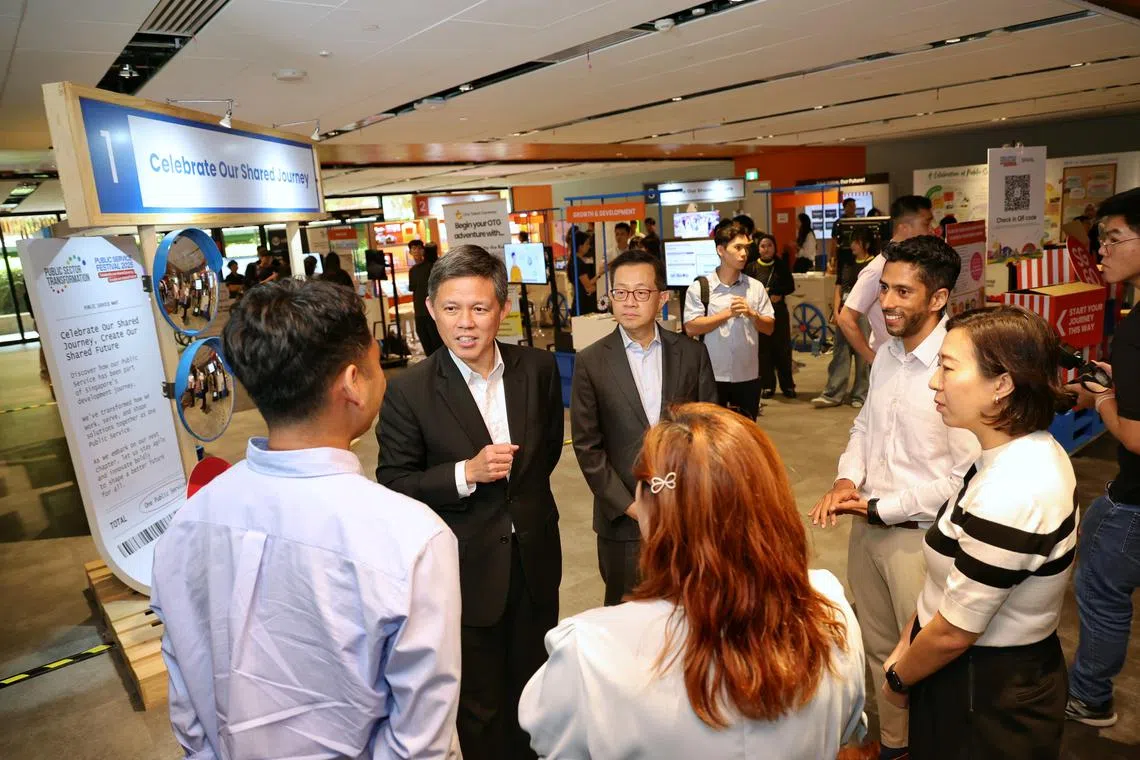Keep citizens at the centre of public service, Chan Chun Sing tells civil servants
Sign up now: Get ST's newsletters delivered to your inbox

Coordinating Minister for Public Services Chan Chun Sing speaking to award recipients at the Public Service Festival 2025 and Public Sector Transformation Awards Ceremony at One Punggol on July 8.
ST PHOTO: KEVIN LIM
SINGAPORE – Double down on good work, innovate together with boldness and keep the focus on citizens.
This is what public servants need to do for Singapore to stay ahead of the curve and meet future challenges, said Coordinating Minister for Public Services Chan Chun Sing on July 8.
Mr Chan, who is also Minister-in-charge of the Public Service, said Singapore can be proud of having done well by global standards, in areas such as quality of life and government services.
But he cautioned against complacency, saying that other countries – including Singapore’s neighbours – are making great strides. In some cases, they have overtaken Singapore, he noted.
“We must be keenly aware that with today’s disruptive technologies, many countries that were previously deemed to be behind us can actually leapfrog what we have achieved over the many years,” said Mr Chan at the Public Sector Transformation awards ceremony held at One Punggol.
“For us, standing still is not an option,” he added.
Mr Chan was speaking to close to 4,000 public officers – some 800 in person and another 3,000 online. A total of 140 awards were presented to agencies and public servants that did well in delivering services, innovating and developing themselves and their teams.
In his 30-minute speech, the minister laid out three priorities for the public service. The first involves making it even easier for people to access government services.
He gave the example of ServiceSG centres
If a senior citizen visits a ServiceSG centre for help with housing, for instance, staff can also offer help for related needs such as healthcare subsidies and social support. This eliminates the need for multiple trips to different agencies.
Mr Chan also cited the GoBusiness platform
But there is scope to go further – for example, allowing a business to apply for the other half of its licences on GoBusiness, he added. He called for a mindset shift, saying this is more important than “just processes and procedures”.
A second priority is for public servants to look beyond their respective agencies.
“We have to constantly look for new opportunities for us to work together to use the resources that we have to achieve the maximum good for our people and country,” Mr Chan said.
Another priority is developing the careers of public service officers, he said, announcing the launch of a new training scheme.
Called the Career Fitness Movement, it will equip public servants with the skills and mindsets to navigate different stages in their careers, he said.
To develop stronger leadership teams, the public service will bring together officers with deep domain expertise and those with broad policy experience, to create diverse teams that can tackle complex challenges.
“This intentional mixing of perspectives helps us to spot blind spots and develop more robust solutions,” said Mr Chan.
Experienced public officers will also be taught career coaching skills, so they can give personalised guidance to their colleagues.
And public servants will be empowered to take ownership of their own development through platforms such as the One Talent Gateway, where they can identify competency gaps and explore career development opportunities.
Besides strengthening and extending their careers, these efforts will ensure “that the public service remains dynamic, resilient and ready for tomorrow’s challenges”, and continues to attract talent, Mr Chan added.
In his speech, he said these changes are necessary because of the challenges Singapore faces, including financial constraints and rising expectations from the public.
Singapore’s ageing population means healthcare spending will increase and “tighten our fiscal space considerably”, he said, adding that climate change and the accompanying carbon budget is another constraint to be managed.
“Many of these constraints are interconnected, and therefore the solutions also need to be developed holistically and across different silos, achieving different trade-offs across different domains,” he said.
On rising public expectations, he said Singaporeans have become used to the convenience of service within a few clicks of the mouse.
He said: “This is what they have achieved in the commercial sector, and when Singaporeans transact with the Government and use government services, they expect no less, if not better. And we will have to rise to the occasion.”
He noted how Singaporeans also have expectations on how they can participate in the process and partner the Government in finding solutions, and welcomed this as an opportunity for the public service to tap the capabilities of Singaporeans.
“That requires us to rethink and rework our processes so that we can embrace such contributions that are forthcoming by fellow Singaporeans,” he said.
He called for a similar approach to businesses that are restructuring and reinventing operations and products in the face of major economic disruptions, and that have similarly high expectations of the Government.
“The tighter our resource constraints going forward, the more we need to think broader and integrate our work and our resource expenditure so that we can achieve bang for buck,” he said.



